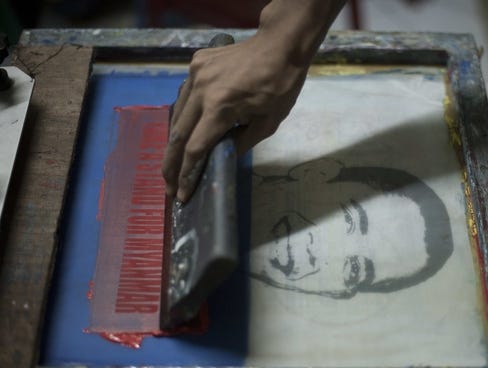USA TODAY
November 16, 2012

A T-shirt-printing-shop worker makes a shirt featuring President
Obama with the words ''Take a stand for Myanmar'' in Rangoon, Burma. /
Nicolas Asfouri, AFP/Getty Images
BANGKOK?? On his first overseas trip since his re-election,
President Obama heads Saturday for the Southeast Asian nations of
Thailand, Burma and Cambodia.
He'll meet a much revered king [King Bhumibol Adulyadej of Thailand], an army general turned president [President Thein Sein of Burma] and a strongman who fought for the murderous Khmer Rouge [Hun Sen of Cambodia].
But throughout his whirlwind, four-day tour, another Asian country
will loom large. For the trip appears set to reinforce the U.S. "pivot"
toward Asia, a strategic shift since 2011 that communist China views as
being aimed squarely at countering its influence and containing its
growth.
All three countries have close China ties, although Burma, amid
dramatic reform away from military dictatorship, has indicated it wants
to reduce its dependence on Beijing.
Other Asian nations have complained of China's aggressive stance in
several territorial disputes over islands claimed by neighboring
countries.
"China must play by the rules," Secretary of State Hillary Rodham
Clinton, who will accompany the president, said while visiting
Australia.
Many Chinese are concerned about American diplomatic competition for
friends around the periphery of China, said Shi Yinhong, an
international relations expert at People's University of China in
Beijing.
"In recent times, China has not done as well as Obama," Shi said.
That failure stems partly from rising nationalism at home.
"In China, people think 'these are our islands,' so it's a difficult
task to strike a balance between foreign policy and strategic
requirements, and, on the other hand, domestic requirements, to show
people you have guts and will defend our national interests
effectively," Shi said.
The presidential visit will "embed the U.S. presence and future power
projection in the region in the context of China's rising influence,"
wrote Kavi Chongkittavorn, a Thai commentator on Southeast Asian
affairs, in The Nation newspaper. "It will also turn ASEAN
(the Association of Southeast Asian Nations) into an arena where the
world's two superpowers can cajole, cooperate and compete."
From Saturday to Sunday, Obama visits Bangkok to meet Thailand's king
and its first female prime minister, Yingluck Shinawatra. The country
is among America's oldest allies in Asia, but tensions exist, including
disagreement over the U.S.-led Trans-Pacific Partnership that Thailand
may join, and Thailand's refusal to allow NASA to use an airfield for
atmospheric monitoring.
On Monday, Air Force One makes its maiden flight to Rangoon, Burma,
also known as Myanmar, to start the first visit by a sitting U.S.
president. The White House, which eased trade sanctions in recent months
against this once-pariah regime, has come under fire from human rights
groups for visiting Burma while ethnic conflicts continue, and rights
abuses remain widespread.
Obama will give a speech on democracy and meet both President Thein
Sein and Aung San Suu Kyi, the opposition leader and democracy icon who
is now a sitting MP, although Burma's parliament remains rigged to
ensure the ruling party and military hold sway.
In Rangoon, also known as Yangon, excitement over Obama's visit embraces all levels of society, said Arthur Myint, an editor at The People's Age, a weekly political journal.
"The interest reflects the changes here. People hope Obama will put
pressure on the government to make more changes," he said Thursday.
"Some political prisoners were released this morning, and people feel
it's connected to Obama's visit."
Unease over China's heavy influence, especially in business, is another reason Obama can expect a warm welcome, Myint said.
"Everyone is happy that Myanmar is getting closer to Western nations, especially the United States," he said.
His last leg, Cambodia, also marks a historic first visit by a
sitting U.S. president. Obama will share the limelight with world
leaders including Russia's Vladimir Putin and China's Wen Jiabao, as
Cambodian Prime Minister Hun Sen hosts the annual ASEAN summit and
seventh East Asia Summit.
But local interest is centered on Obama, said Sambath Samoeurn, 25, a marketing employee at a Phnom Penh newspaper.
Residents have put up pictures of Obama in their homes and prepared welcome banners, he said. Others are preparing protests.
"Many people here will raise issues, for example about land
conflicts; they want to push Obama to take action," he said, noting that
heavy security will likely keep protesters far from Obama's view.
Cambodian problems such as land grabs and the rich-poor divide are
highly familiar to Premier Wen from a China also riven with inequality,
but Beijing's focus will center on the summit's most sensitive topics,
maritime security and disputes in the South and East China seas.
Washington argues for a multilateral approach and a regional code of
conduct, while Beijing insists on bilateral negotiations.

No comments:
Post a Comment